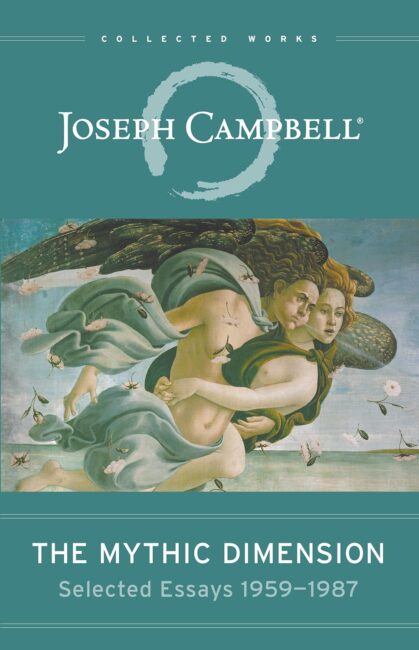This is a Mindfunda book review about “The Mythic Dimension“, a compilation of essays written by Joseph Campbell, dusted off and reprinted in a paperback. It will help you unleash your own inner Yoda.
The Mythic Dimension, Selected Essays 1959-1987
by Joseph Campbell
Edited by Robert Walter & David Kudler
New World Library 2017 ISBN 9781608684915 $13.47

Click link to buy the book and support Mindfunda
Joseph Campbell: the yoda of george lucas
Joseph Campbell brought mythology to the American people. His interviews with Bill Moyers, broadcasted in 1988 as “the Power of Myth” appealed to people. The easy way Joseph Campbell spoke about myths, compared myths as answers to worldwide challenges of the human race, it hit a core within a lot of people.

George Lucas, director of the Star Wars episodes, called Campbell his own Yoda. They met in 1984, and Campbell and his wife Jean visited the ranch of Lucas to watch three Star War films. Joseph allegedly said: “‘You know, I thought real art had stopped with Picasso, Joyce, and Mann. Now I know it hasn’t.”
It was George Lucas who introduced Campbell to Moyers and made the interviews of “the Power of Myth” possible.
Unleashing your Yoda by Joseph Campbell tip #1
Everything is a metaphor
It might sound simple, but please don’t shrug your shoulders. Do you know how much your perspective on the world changes once you see everything, including yourself, as a symbol, a part of a greater unity of meaning?

“One of the most effective ways to rediscover in any myth or legend the spiritual ‘tenor’ of its symbolic “vehicles” is to compare it, across the reaches of space, or of time, with homologous forms from other, even greatly differing traditions” (page 201).
If you look at the story of your life and consider yourself a metaphor, which one would it be? What is the first thing that pops up in your mind? Let me know in the comments!
UNLEASHING YOUR YODA BY JOSEPH CAMPBELL TIP #2
There is such a thing as a mythical archetype
We all know archetypes. Images we know universally, like the old wise man. But before I read this book, I had never realised that there are specific archetypes that indicate mythological themes.

The Tree of Life is an example of a mythological archetype.
How does this make your life easier you might ask? Well, according to Campbell: “Like life itself, such mythological archetypes simple are” (page 234).
But now you are going to be disgruntled with me. We have uncovered mythological archetypes just to find out we are not supposed to do anything with it. That takes me to tip #3.
UNLEASHING YOUR YODA BY JOSEPH CAMPBELL TIP #3
East is different from West
Thinking that we have to act all the time to change our fates, our lives and turn things around for the better is not always necessary. Campbell clearly distinguishes a difference between East and West.
“Oriental Mythology”: “the rich yet essentially unified major province represented by the philosophical myths and mythological philosophies of India, Southeast Asia, China and Japan-to which should be joined the much earlier yet spiritually related mythological cosmologies of archaic Mesopotamia and Egypt” (page 19).
This mythology assumes a cyclic view on life. “there was never a time when time was not, nor will there be a time when time will have ceased to be”.

Ha, but now you are going to say (and that why I love you reader): we in the West have adopted an Eastern religion. Yahweh was a god of Israel. An old god who originated in the Iron Age.
The difference between East and West in a mythological sense is in the fact that the Western god is a person, while the Eastern god is and energy. The Western god is a person that is easily offended, kicks people out of paradise and puts a ward outside to make sure they will never get back in again.
The Eastern religions encourage people to embrace the energies within and enter the paradise, not after death but in waking life. By meditating, by eating certain foods, using certain herbs and acting in specific ways.
So what can we learn from Campbell: put all religion in its historical perspective.
UNLEASHING YOUR YODA BY JOSEPH CAMPBELL TIP #4
Mythology has 4 functions: mystical, cosmological, sociological and psychologic.
The first is a mystical function.
Mythology reconciles consciousness with the preconditions of its own existence. Life sucks. Good news is: it sucks for everybody, there are no exceptions. Mythology helps you to make sense of the earth, the injustice in this world, it helps you come to terms with the fact that you have to kill to stay alive.

The second is a cosmological function.
Mythology offers an image of the universe and your place in it. “All things should be recognized as parts of a single great holy picture, an icon as it were: the trees, the rocks, the animals, sun, moon, and stars, all opening back to mystery, and thus serving as agencies of the first function, as vehicles and messengers of teaching” (page 220).
The third is a sociological function.
Mythology paints a picture of the cosmos and in doing so they paint your place in it. A mythology serves as a rulebook for social behaviour.

Think about how in the bible there are the ten commandments of Moses: those are social rules that guide people to live together in relative harmony.
The fourth function of mythology is psychological.
This lies at the root of any myth. Each mythological tale can shape you as a person. Human beings are young relatively long. All of a sudden you are supposed to take care of yourself. You go from a place were you take orders from your parents and follow their rules to a position were you are the one solving the problems.
You have a second social birth: you need to manifest yourself in the world and understand the rules. And those rules are often unwritten. Rules like: greet everyone you meet on the street, don’t offend your boss/husband/wife, laugh when you are the subject of a joke…
UNLEASHING YOUR YODA BY JOSEPH CAMPBELL TIP #5
Dreams are our personal myths
As stated above, mythology has a cosmological function. The cosmos is filled with mysterious energies. Campbell describes it as a “sphere”. The Dream Consciousness is such a sphere.
“The deities of vision are of this sphere and of the same luminous stuff as dream. Accordingly, the vision and the visionary, though apparently separate, are one, and all the heavens, all the hells, all the gods and demons, all the figures of the mythic worlds, are within us as portions of ourselves -portions that is to say, that are of our deepest primary nature, and thus of our share of nature” (page 212).
So dear Mindfunda reader, dream on!
CONCLUSION
PRO
- This is a yummy book. Easy to read, enjoyable, entertaining and you will learn a thing or two underway;
- There is a whole chapter on the Goddess;
- The first part of the book puts mythology in a historical perspective;
- The second part of the book puts mythology in a creative perspective;
- Both perspectives give you new perspectives on mythologies: even when you thought you knew Joseph Campbell by now, this book can be regarded as a groundwork of his whole work.
CON
- Campbell’s monomyth is a bit dated. Campbell was cherry-picking and constructing his hero myth. He died 33 years ago, mythology has moved on now;
- The hero story is a male story, it is not particularly tuned into the female gender.
Mindfunda verdict:
8,5/10
Do you like this post? Feel Free to Share
Our Current Courses (Click to find out More)
Sign up for our free e-book: 10 easy ways to instantly improve your dream memory


Hi Deborah,
Maureen Murdock, without a doubt, with her book the heroin’s journey. Rumour has it that she was a student of Campbell and asked him how women should interpret the hero’s journey and he just shrugged and said: “they don’t have to, they are women”.
The Princess and the Pea is in my eyes about authenticity. Having the guts to speak out that something is not right. In bed, you should be able to dream the most beautiful dreams, without being disturbed by hard issues, even if they are as small as peas. Dreaming is the door to rekindle your own authenticity.
Thanks so much Susanne for giving me more “Pea” to think about and Maureen’s wonderful book title! Blessings always, Deborah.
Many thanks Susanne for gifting me more to consider with the “Princess” story and for Maureen Murdock’s wonderful book title … I’m off to Amazon and my wish list again! 🙂
Hi Susanne, Now that was great! Your book review tempts me to buy (yet another!) book or at least add this one to my ever growing Amazon wish list. I thoroughly enjoyed watching and reading Joseph Campbell’s “The Power of the Myth” although I’ve yet to read any of his earlier work … I do have more books on my shelves. Do you have any great book recommendations for “The Heroine Story” I would love to read a good one.
When I was a child I was fascinated by many tales, Sleeping Beauty, Cinderella and Snow White … yet the one that captivated me most was Anderson’s tale “The Princess and the Pea” which I was reading into my early teens, such was the pull! Perhaps this is my own personal myth? A story of being tested in order to prove one’s authenticity … be interested to hear if you know this fairy tale and what you think. Warm wishes, Deborah.